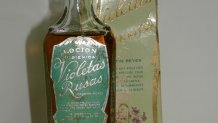If you grew up in Miami and are of Hispanic descent, chances are high that you smelled like violets as a baby and sometimes beyond your childhood years.
The tradition started in Havana almost 90 years ago when a man named Agustin Reyes developed the first violet-scented cologne in Cuba.
The fragrance was not intended to become a baby cologne but the light, fresh scent became popular among Cuban mothers, who doused their infants in the mixture.
"It was difficult. Sure, at the beginning people didn’t understand it. You know, it was ‘what is this? What do you use it for? Perfume for babies," said Agustin Reyes III, who currently runs the business his grandfather established, from a plant in Hialeah.
A year after Castro's revolution took effect, the Reyes family fled the communist island with the formula covertly in hand.

Once settled in Miami, they reestablished the business with the fragrance that had brought them success on the island nation.
Word of mouth quickly spread among the Cuban exile community and Agustin Reyes, Inc. enjoyed newfound success, picking up on a tradition that went on to become iconic in the Cuban culture and beyond.
Decades later, the shelves at most Miami drug stores remain stocked with more than ten brands of the fragrance.

"Very few fragrances are that timeless. You can count them on one hand, you know, how many of those 1920s fragrances, by the most famous fragrance companies in the world are still around," said Reyes III.
Cuban-American celebrities such as Gloria and Emilio Estefan purchase the bottles by the case, according to Reyes III.
The actress Eva Mendes has also repeatedly mentioned the product in her lists of favorite things and many “Miami girls”, even some in their teenage years, continue splashing on the scent before school or after soccer practice.
Agustin Reyes III prides himself on continuing to develop the scent in-house, as opposed to most fragrance houses, while using the original formula his grandfather created nearly nine decades ago.
Reyes says, he does this in order to maintain the authenticity of the product and the tradition.




